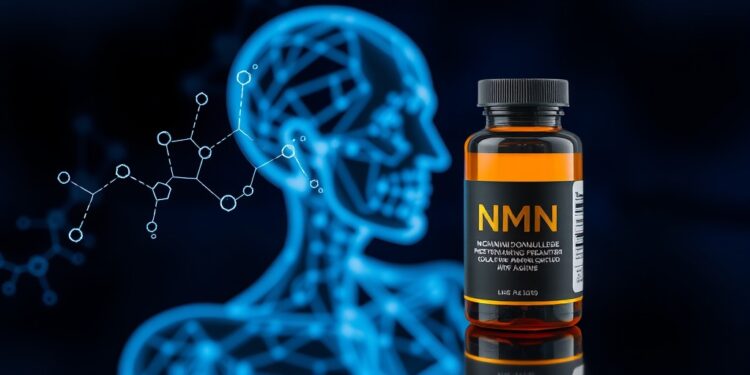Nicotinamide Mononucleotide (NMN) has emerged as a beacon of hope in the quest for longevity, capturing the attention of both consumers and scientists. As the global elderly population rises, the demand for effective anti-aging solutions has surged, leading to the proliferation of NMN-based health products. While the promises of NMN are compelling, the safety concerns and lack of comprehensive human trials underscore the need for rigorous scientific scrutiny.
The decline of Nicotinamide Adenine Dinucleotide (NAD+) levels in the body is intrinsically linked to aging, manifesting in reduced mitochondrial energy production, oxidative stress, DNA damage, and cognitive impairments. NMN, a precursor to NAD+, has shown the potential to mitigate these age-related complications by replenishing NAD+ levels. Preclinical studies and animal models have demonstrated NMN’s efficacy in combating conditions such as Alzheimer’s disease, type 2 diabetes, obesity, and cardiovascular diseases. Despite these encouraging findings, the dearth of long-term clinical safety data raises critical questions about the widespread use of NMN as a health supplement.
Scientific investigations have identified NMN as a bioactive nucleotide formed from nicotinamide and ribose, naturally occurring in certain fruits, vegetables, and meats. NMN’s role in NAD+ biosynthesis positions it as a vital compound in cellular energy metabolism and DNA repair. Animal studies have elucidated its ability to enhance mitochondrial function, reduce inflammation, and improve insulin sensitivity. Yet, translating these benefits from animal models to humans remains a significant challenge. Currently, NMN products flood the market, with doses often exceeding 500 mg per day, despite insufficient evidence to substantiate their safety for prolonged use.
Early clinical studies have reported promising results regarding NMN’s bioavailability and short-term safety. For instance, a study involving healthy men demonstrated that single doses of NMN ranging from 100 to 500 mg were well-tolerated without adverse effects. Similarly, animal studies have revealed NMN’s potential to reverse age-related vascular dysfunction, cognitive decline, and metabolic disorders. However, these findings are tempered by concerns over high-dose administration and long-term implications. The toxicological profile of NMN in humans remains underexplored, necessitating extensive clinical trials to establish safe dosage thresholds and understand potential risks.
The burgeoning NMN market underscores a critical gap in regulatory oversight. As manufacturers capitalize on the anti-aging hype, the absence of stringent approval processes exposes consumers to unverified claims. Unlike heavily regulated pharmaceutical drugs, NMN supplements often bypass rigorous safety evaluations, being marketed as functional foods. This regulatory void has prompted calls for stricter standards to ensure the safety and efficacy of NMN products.
Beyond its anti-aging promises, NMN’s therapeutic potential spans a wide array of conditions. Research highlights its role in mitigating Alzheimer’s pathology, restoring mitochondrial bioenergetics, and reducing oxidative stress. NMN supplementation has also shown promise in addressing reproductive aging, enhancing oocyte quality, and supporting embryonic development in aged animal models. Despite these advances, the lack of longitudinal human studies raises concerns about potential side effects. Prolonged NAD+ upregulation, for instance, may exacerbate certain aging-related phenotypes, underscoring the need for a balanced approach to supplementation.
Emerging evidence suggests that NMN’s effectiveness is mediated through its impact on sirtuin activity, mitochondrial function, and oxidative stress regulation. By boosting NAD+ levels, NMN enhances sirtuin-mediated deacetylation processes, which are crucial for cellular longevity. Furthermore, NMN has been shown to restore mitochondrial communication with the nucleus, a critical factor in maintaining cellular homeostasis. These mechanisms underscore NMN’s potential as a therapeutic agent for age-associated diseases.
While NMN’s pharmacological benefits are promising, its safety profile warrants thorough investigation. Adverse effects associated with other NAD+ precursors, such as Nicotinamide Riboside (NR), highlight the potential risks of excessive NAD+ supplementation. High doses of NR have been linked to liver dysfunction, insulin resistance, and lipid abnormalities. Comparatively, NMN has demonstrated a favorable safety profile in animal studies, but human data is limited. The absence of comprehensive toxicological studies leaves critical gaps in understanding NMN’s long-term implications.
The scientific community’s consensus emphasizes the urgent need for rigorous clinical trials to evaluate NMN’s efficacy and safety. Ongoing studies aim to elucidate its pharmacokinetics, optimal dosages, and potential interactions with existing therapies. The outcomes of these trials will be pivotal in defining NMN’s role in geroscience and its translation into mainstream healthcare.
In conclusion, NMN represents a promising frontier in the pursuit of healthy aging, with its ability to replenish NAD+ levels and mitigate age-related dysfunctions. However, the rapid commercialization of NMN products, coupled with insufficient human safety data, highlights the need for caution. Regulatory frameworks must be strengthened to ensure that NMN supplements meet stringent safety and efficacy standards. Until then, consumers are advised to approach NMN supplementation with informed skepticism, recognizing that the scientific validation of its anti-aging claims is still a work in progress.
Subject of Research: Anti-aging effects and safety of Nicotinamide Mononucleotide (NMN)
Article Title: Nicotinamide mononucleotide (NMN) as an anti-aging health product – Promises and safety concerns
News Publication Date: 2025-01-12
Article Doi References: 10.1016/j.jare.2021.08.003
Image Credits: Not available
Keywords: NMN, anti-aging, NAD+, longevity, mitochondrial function, clinical trials, safety concerns, sirtuins, oxidative stress, regulatory standards





